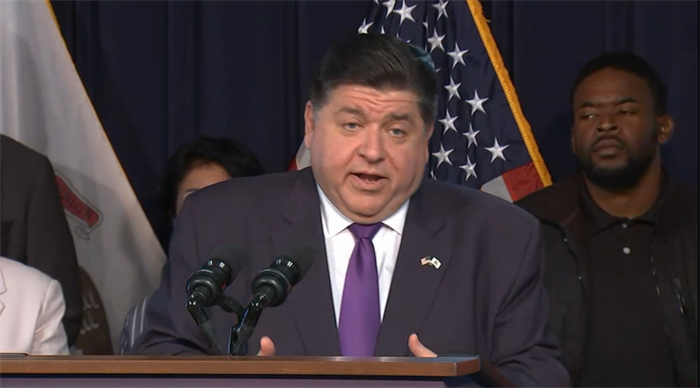Temporary tax relief measures to begin Friday in Illinois; rebates to be mailed, other taxes put on temporary pause

SPRINGFIELD – Illinoisans will receive some modest tax relief starting Friday when the state’s new fiscal year begins.
That includes some income tax rebates, property tax rebates, a suspension of the state’s 1 percent tax on groceries, and a six-month pause on the scheduled inflationary increase in the state’s motor fuel tax.
Gov. JB Pritzker and legislative Democrats held a news conference publicizing those tax breaks as consumers grappled with 8.6 percent inflation, the highest rate in nearly 40 years.
“We’re sending $1.8 billion in tax relief to Illinois families, and we are able to do that because Democrats balanced the budget, eliminated the bill backlog, and state government is now running a surplus,” Pritzker said at a news conference in Chicago.
The news conference came just two days after the state’s primary elections, marking the kick-off to the general election cycle in which Pritzker and Democrats, who control both chambers of the General Assembly, will be touting their fiscal management of the state.
“Fiscal responsibility means Illinois taxpayers are no longer required to pay hundreds of millions of dollars in needless interest payments,” Pritzker said. “Instead, we are able to better fund education, rebuild our roads, make our neighborhoods safer, attract new businesses to Illinois, and connect workers with good paying jobs. And starting tomorrow (Friday), every Illinoisan will get tax relief on essentials, gas, groceries and your home.”
The tax relief measures were included in the $46 billion budget lawmakers passed for the fiscal year that begins Friday. They include:
- An income tax rebate of $50 per individual with income below $200,000 a year, or $100 for couples filing jointly with income below $400,000 a year, plus $100 per dependent child, up to three children.
- A suspension of the 1 percent sales tax on groceries through June 2023.
- A suspension of the scheduled inflationary increase in the motor fuel tax through Dec. 31, which has been estimated at 2.2 cents per gallon. Instead, the motor fuel tax will increase twice at the rate of inflation next calendar year.
- A sales tax holiday on back-to-school items, to run from Aug. 5 to Aug. 14, when the rate will be imposed at 1.25 percent instead of the regular 6.25 percent.
- And an additional property tax rebate of up to $300 for homeowners who were eligible to claim the property tax credit on their 2021 state tax returns. The rebate is available to joint filers earning $500,000 or less and single filers earning $250,000 or less.
In addition, the tax relief package included a permanent expansion of the state’s earned income tax credit, or EITC, to 20 percent of the federal EITC while also extending eligibility for that credit to noncitizens who file taxes using an Individual Taxpayer Identification Number instead of a Social Security Number.
Republicans criticized that package as an election-year gimmick, noting that the rebate checks would show up in people’s mailboxes or bank accounts before Election Day, while motor fuel tax suspension would disappear soon after Election Day.
They also criticized some of the tax breaks as too small or for not being permanent; noting that the grocery tax suspension would only save consumers $1 on a $100 grocery bill, and the motor fuel tax savings would save only 22 cents on a 10-gallon tank of gas.
They proposed an alternative, which would have suspended or capped the state’s 6.25-percent sales tax on motor fuels, which they say has been producing a windfall for the state as gasoline prices have soared to record levels.
According to AAA, the average price of gasoline in Illinois stood at $5.39 on Thursday. That includes 37 cents of sales tax.
But Democrats pushed back against that criticism, arguing that they have passed balanced budgets each of the last four years that have resulted in two credit upgrades each from all three major rating agencies and eliminated the bill backlog while also making investments in important state services.
“The reality is we are making fiscally responsible decisions,” state Sen. Elgie Sims, D-Chicago, said at the news conference. “We are investing in the issues that will help our communities grow and be stronger. We’re investing in education. We’re investing in health care. We’re investing in public safety. We’re investing in a brighter future for Illinoisans.”
Miss Clipping Out Stories to Save for Later?
Click the Purchase Story button below to order a print of this story. We will print it for you on matte photo paper to keep forever.

